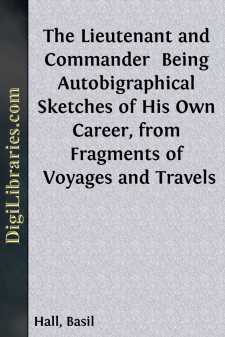Categories
- Antiques & Collectibles 13
- Architecture 36
- Art 48
- Bibles 22
- Biography & Autobiography 813
- Body, Mind & Spirit 142
- Business & Economics 28
- Children's Books 15
- Children's Fiction 12
- Computers 4
- Cooking 94
- Crafts & Hobbies 4
- Drama 346
- Education 46
- Family & Relationships 57
- Fiction 11828
- Games 19
- Gardening 17
- Health & Fitness 34
- History 1377
- House & Home 1
- Humor 147
- Juvenile Fiction 1873
- Juvenile Nonfiction 202
- Language Arts & Disciplines 88
- Law 16
- Literary Collections 686
- Literary Criticism 179
- Mathematics 13
- Medical 41
- Music 40
- Nature 179
- Non-Classifiable 1768
- Performing Arts 7
- Periodicals 1453
- Philosophy 64
- Photography 2
- Poetry 896
- Political Science 203
- Psychology 42
- Reference 154
- Religion 513
- Science 126
- Self-Help 84
- Social Science 81
- Sports & Recreation 34
- Study Aids 3
- Technology & Engineering 59
- Transportation 23
- Travel 463
- True Crime 29
Basil Hall
Basil Hall (1788–1844) was a Scottish Royal Navy officer and travel writer. He is best known for his detailed travel accounts, including "Voyages and Travels in South America, India, and China" and "Fragments of Voyages and Travels," which provided vivid descriptions of his global explorations. Hall also wrote "Travels in North America in the Years 1827 and 1828," where he shared his observations of American society and culture. His works were widely read in the 19th century, offering readers insights into distant lands and fostering curiosity about foreign cultures.
Author's Books:
Sort by:
by:
Basil Hall
PREFACE. The following work contains a Narrative of the Voyage to the West Coast of Corea, and the Great Loo-choo Island; an Appendix, containing Nautical details; and a Vocabulary of the Language spoken at Loo-choo. In drawing up the Narrative from journals written at the time, I have derived great assistance from notes made by Lieutenant H.J. Clifford, of the Navy. This officer obtained permission...
more...
by:
Basil Hall
TAKING A LINE IN THE SERVICE. That there is a tide in the affairs of men, has very naturally become a figure of frequent and almost hackneyed use in the cockpits, gun-rooms, and even the captains' cabins of our ships and vessels of war. Like its numerous brethren of common-places, it will be found, perhaps, but of small application to the real business of life; though it answers capitally to wind...
more...



